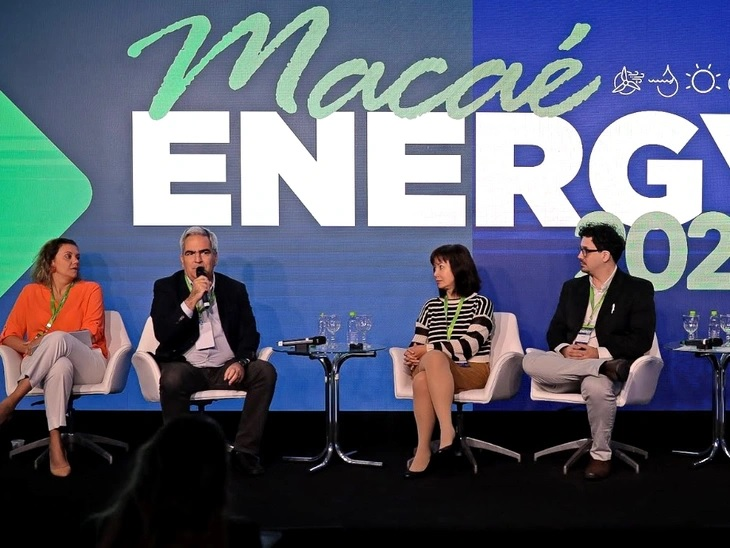Macaé and the surrounding region are highlighted as a hub for the energy transition in Rio.
During Macaé Energy 2024, companies highlighted the Northern Fluminense Region as a strategic location for developing opportunities in oil, natural gas, as well as offshore wind, hydrogen, and other renewable energies.
T&B Petroleum/Press Office Firjan17/06/2024 14:15

Heloísa Borges, Director of Oil, Gas, and Biofuels Studies at EPE, stated that the solution to the climate problem includes the oil and gas market. "Investments in this market are fundamental for developing the technologies necessary for the decarbonization of the economy," she said. The EPE director also mentioned that a quarter of the PAC resources are allocated to the oil and gas industry.
Daniel Lamassa, Deputy Secretary of Energy of the State Secretariat for Energy and Sea Economy of Rio de Janeiro, reminded that the state already has 15 offshore wind projects in licensing, including the Pilot Project carried out by the Secretariat. "The development of the pilot project for a wind farm at the Port of Açu will be 100% financed by R&D funds from ANP and ANEEL, and it involves collaboration with the main stakeholders through the Working Group established for the project development," he added.
According to Ezequiel Zago, Business Development Manager at Prumo Logística, strategies to work with renewable energy at the port terminal began in 2019. "There are projects under development and study to harness the port's potential for biomass, solar, offshore wind, and hydrogen generation. The port is already connected to the National Interconnected System through GNA's two thermoelectric plants. A 220 MW solar plant is also under development," he said.
Gabriel Lassery, Executive Superintendent of ABH2, stated that hydrogen is one of the main vectors for the future of Brazil's energy matrix. Liu Su, Manager of Renewable Business Permits/Origination at Neoenergia, highlighted that the country already has a consolidated infrastructure, with 10,000 km of power transmission lines and five concessionaires. According to Liu, "the transition is always very gradual, but Rio is already distinguished by being not only the largest producer of oil and gas but also the only nuclear generator in the country."
Henrique Osório Santos, Director of Firjan, noted that the opportunities in the region and the state were highlighted in the publication "Energy Transition and Integration in Rio," produced by Firjan SENAI, which presents more than USD 70 billion in potential investments that can be developed in dozens of offshore wind and hydrogen projects, among others. The summary of the study was released at OTC Houston last month and distributed to all participants of Macaé Energy.
Natural Gas Economic Transformation
The panel "Natural Gas – Economic Transformer" brought together five companies operating in the sector. Christiane Delart, Director of Gas Distribution at Naturgy, emphasized that although the state is a reference in the use of natural gas in vehicles, adoption in heavy transport is still low. Vladimir Paschoal, advisor at Agenersa, reinforced the need to advance regulations for heavy vehicles, promoting competitiveness and ensuring tariff affordability for the captive market.
The advisor also pointed out that with the advancement of the gas market, its regulation will increasingly depend on the interaction between agents. "The trend is for more interstate projects to emerge, which is why the Brazilian Association of Regulatory Agencies is bringing stakeholders together to promote competitiveness in the free market," he highlighted.
The panel also discussed the importance of fully resuming the activities of regulatory agencies such as ANP and ANEEL and other federal entities like IBAMA. The restriction of resources was identified as a factor directly affecting the full functioning and evolution of the market, deterring investments due to the regulatory debt generated.
For Ovídio Quintana, Commercial Director of TAG, investments need to focus on tariff affordability and logistical balance to meet market growth. Quintana cited the example of the Northeast, where significant savings were achieved by reducing the price of the gas molecule, emphasizing the importance of investments and removing regulatory obstacles, mentioning the "Brazil Cost."
The discussions also included contributions from Rogério Manso, Executive President of ATGás; Daniela Santos, partner at SG Advogados; and Alexandre Calmon, partner at Campos Mello Advogados. They highlighted the importance of natural gas to the economy, emphasizing the role of Rio and Macaé in national infrastructure, and the opportunities and challenges for opening up the gas market.
The first edition of Macaé Energy took place from June 11 to 13, promoting 15 panels with 1,860 minutes of lectures, debates, and meetings. The event brought together 90 debaters, experts in oil, gas, and renewable energies from private companies, entities, associations, and government representatives. It also promoted the Opportunity Network with around 350 representatives of supplier companies and major market players. During the three-day event, about a thousand people participated in Macaé Energy 2024.
Karine Fragoso, General Manager of Oil, Gas, Energy, and Naval at Firjan, highlighted the opportunity for companies to build new market development perspectives from the event in the energy capital city. "Macaé Energy is not just an event; it is a continuous construction of an increasingly promising future for Macaé and the entire Northern Fluminense region," she said.




